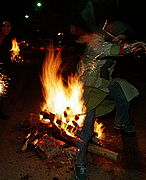Fire-Jumping With a Flavor of Protest
» Rooz Reports on the Most Political Night of the Year
Amid tight security, Iranians celebrated the most political fire-jumping festivities known as Chahar-Shanbe Souri, this Tuesday. This traditional Persian festival has been banned by officials of the Islamic republic and has been called “superstitious beliefs lacking religious basis and promoting corruption” even though these remain traditional rituals and national festivities for Iranians because they have been held since 1,700 years before the birth of Christ.
According to Rooz reporters, people in various Iranian cities and towns created small fires and jumped over them on Tuesday evening celebrating the Shahar-Shanbe Souri ritual under the watchful eyes of the security forces. But soon the festivities picked up a political tone as people began to shout “Death to the Dictator” and “Shame on You Dictator, Leave the Country.”
In Tehran and some other cities, the events took a violent turn when motor-bike riding security and militia forces try to intervene.
Snipers on Rooftops
The Shahar-Shanbe Souri festivities were held on Tuesday as government agencies and organization were shut early at 2pm and motor-bikes were banned from moving around the city in Tehran.
But the early shutdown was not limited to the government, schools too were shut early. A worker at a private company told Rooz that he and his colleagues were told that they were off at 2pm and that they had to go home.
And while people were barred from riding motor-bikes, Basiji militiamen roamed the city on motorbikes in groups of 10 and 15 bikers and each group carried a fire-extinguisher. Eye witnesses said that in addition to the Basiji bikers, the main squares and circles in the city were patrolled by military men and as if martial law had been declared. A Rooz reporter wrote, “They had brought out all of their forces, from the Sarollah brigades to the NOPO, the special youth brigade, etc. The main difference between Tuesday and other days was that sharp-shooters and snipers in teams of twos and threes had been position on high rise roof tops on Vali Asr and Engelab avenues and also around key city squares.
Prior to this and on February 14, 2011, very young men had been brought out to suppress protestors and on March 8, International Woman’s Day women agents were used for the first time and now we have sharp-shooters roaming the streets and watching from above.”
An eye witness resident of Tehran said that he saw “Plainclothes agents roaming the streets wearing medical masks, something that was first seen about two or three months ago. It was ironic because the year before it was protestors who wore masks so that they could not be identified by security agents whereas now it was Basiji militia and military men who wore masks not to be identified.”
Festivities Along with Political Protests
A Rooz reporter writes that, “While the main streets of Tehran were generally empty on Tuesday because of the unofficial martial law imposed by the regime, people danced and celebrated while jumping over fire on side streets, residential communities and allies.”
Some video clips that have appeared on YouTube show people chanting “Death to the Dictator,” “Shame on You Dictator, Leave the Country Dictator,” “Ben Ali, it is Now the Turn of Seyed Ali,” a reference to Tunisia’s leader Zine al-Abidine Ben Ali who was ousted from power in January this year amid massive public protests. A published photograph showed a large poster that had been placed on Modarres Highway with these messages: Dictator, Welcome Your End. A similar poster had been hung on February 20th as well.
In another video clip on YouTube, people are shown to burn an effigy of Mahmoud Ahmadinejad and ayatollah Khamenei.
On Sattar Khan avenue, people released green balloons into the sky and in Yousefabad they in unison sang the popular national song “Oh Iran”.
These festivities and their political messages were not confined to the upper parts of Tehran that are the residential districts of the wealthier Iranians. In the southern part of the city too, people publicly displayed their festive moods and chanted slogans. A Rooz reporter wrote that in the south, people changed Allaho Akbar and “Death to the Dictator.”
There were also reports of tear gas being used in the Tehran Pars, Haft Howz and Rudaki districts of the capital.
“Death to the Dictator” was the common slogan that was chanted not just in Tehran but also in other cities that included Ahwaz, Shiraz, Bushehr, Kermanshah, Ardebil, Tabriz, Sanandaj, Borujerd and Rasht. In Shiraz, chants of “Not for Gaza, or for Lebanon, I will Sacrifice My Life for Iran” were also heard.
No reports have been received of the number of arrests that were made on Tuesday. Prior to this, Alireza Avai, the influential prosecutor of Tehran had said, “Criminals who will be arrested on Tuesday will not be released until the end of the Nowruz New Year festivities.”
Rooz reporters also described this year’s Nowruz festivities to be different in another way. Unlike previous years when the security forces would strive to combat and challenge those who engaged in Chahar-Shanbe Souri festivities, this year the security forces actually encouraged people to celebrate and be happy so as to prevent them from turning the gatherings into a political demonstration against the regime. The Green Movement had invited people to protest every Tuesday, and so the Chahar-Shanbe Souri fire jumping celebration had a double take for them.
The head of Iran’s fire fighting organization told semi-state run Fars news agency that a total of 255 incidents had been reported until 10pm on Tuesday, none of which were fatal. Jamshid Shafii further said, “136 of these incidents involved setting trashcans on fire, 53 were related to trash, 25 were fires in residences, 23 in open spaces, 15 in vehicles and 3 were the results of firecrackers. A total of 21 people received minor injuries because of these incidents.


